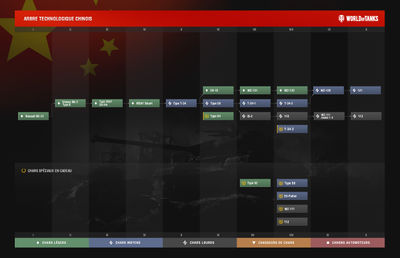Difference between revisions of "Tanks of China"
| Revision as of 00:16, 20 July 2014 | Revision as of 22:09, 4 August 2014 | |||
| Line 1: | Line 1: | |||
| ? | [[image:Graffiti_stickers_china.png|left|link=|]] Vehicles imported into or designed by the various 20th-Century Chinese states | + | [[image:Graffiti_stickers_china.png|left|link=|]] Vehicles imported into or designed by the various 20th-Century Chinese states and Taiwan. Communist Chinese tanks tend to carry the largest possible calibers into battle but pay heavily for the privilege. | |
| ---- | ---- | |||
| ? | China's tank development consisted of three phases. Prior to 1950 China relied on foreign made tanks purchased from or supplied by France ([[Renault_NC-31|Renault NC31]]), Britain ([[Vickers_Mk._E_Type_B|Vickers Mk.E B]]), the USA ([[M5A1_Stuart|M5A1 Stuart]]), as well as tanks seized from Japan at the end of WWII ([[Type_2597_Chi-Ha|Chi-Ha]]). Chinese tanks through Tier-4 represent this period. In the early 1950s China was heavily influenced by vehicles, notably the T-34 and the IS-2, which were provided to China by the Soviets together with design and fabrication assistance for local production. By the late 1950's China began developing its own tanks by making modifications and improvements on the Soviet T-54 design. The Chinese Type-59 main battle tank and Type-62 light tank were the first Chinese tanks to be mass produced. | + | China's tank development consisted of three phases. Prior to 1950 China relied on foreign made tanks purchased from or supplied by France ([[Renault_NC-31|Renault NC31]]), Britain ([[Vickers_Mk._E_Type_B|Vickers Mk.E B]]), the USA ([[M5A1_Stuart|M5A1 Stuart]]), as well as tanks seized from Japan at the end of WWII ([[Type_2597_Chi-Ha|Chi-Ha]]). Chinese tanks through Tier-4 represent this period. In the early 1950s China was heavily influenced by vehicles, notably the T-34 and the IS-2, which were provided to China by the Soviets together with design and fabrication assistance for local production. By the late 1950's China began developing its own tanks by making modifications and improvements on the Soviet T-54 design. The Chinese Type-59 main battle tank and Type-62 light tank were the first Chinese tanks to be mass produced. The tier 6 light tank Type 64 was produced by the ROC from Taiwan, which strongly resembles some USA light tanks characteristics, being somewhat agile and fast firing gun. | |
| ---- | ---- | |||
Revision as of 22:09, 4 August 2014

China's tank development consisted of three phases. Prior to 1950 China relied on foreign made tanks purchased from or supplied by France (Renault NC31), Britain (Vickers Mk.E B), the USA (M5A1 Stuart), as well as tanks seized from Japan at the end of WWII (Chi-Ha). Chinese tanks through Tier-4 represent this period. In the early 1950s China was heavily influenced by vehicles, notably the T-34 and the IS-2, which were provided to China by the Soviets together with design and fabrication assistance for local production. By the late 1950's China began developing its own tanks by making modifications and improvements on the Soviet T-54 design. The Chinese Type-59 main battle tank and Type-62 light tank were the first Chinese tanks to be mass produced. The tier 6 light tank Type 64 was produced by the ROC from Taiwan, which strongly resembles some USA light tanks characteristics, being somewhat agile and fast firing gun.
Chinese tanks, for the most part, have unparalleled mobility, good camouflage values and sloped armor. This makes their tanks very flexible regardless of if they are a heavy, medium, or light. They still play as you would expect, but they can often change their combat role a bit, should it be necessary. However, they have very poor gun depression, even worse than German or Russian tanks. They also have very poor module health, and their modules are usually exposed. This results in frequent crew loss, destroyed tracks, engine fires, or even ammo rack detonation. However, while most Chinese tanks have (comparably) poor hull armor, their turret armor is unparalleled, sometimes even surpassing the hull armor values of heavy tanks.
Chinese Light Tanks are fast, agile, and have good penetration and accuracy. They play very much like medium tanks. Their armour is really the only thing identifying them as light tanks.
Chinese Medium Tanks are, up to a point, very similar to the Soviet ones, combining mobility and firepower, at the expense of a low rate of fire and poor gun depression. At higher tiers they gain firepower and become more adept at brawling than their Soviet counterparts, while being less well-rounded.
Chinese Heavy Tanks are also similar to the Soviet models on which they were based. These tanks have good frontal armor and acceleration and faster rates of fire, which makes it possible to play them as "heavy" mediums. Later on they focus more on deflection and maneuverabilty.
